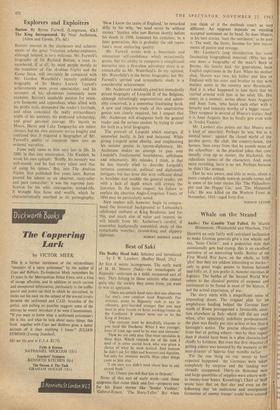Explorers and Exploiters
RECENT interest in the characters and achieve- ments of the great Victorian scholar-explorers, although belated, is very welcome. Mr. Farwell's biography of Sir Richard Burton, a man re- membered, if at all, by most people merely as the translator of The Arabian Nights and the Kama Sutra, will inevitably be compared with Mr. Gordon Waterfield's recently published biography of Sir Henry Layard. Layard's achievements were more spectacular, and his accounts of his adventures immensely more readable; Burton's insatiable passion for exten- sive footnotes and appendices, when allied with his prolix style, demanded the reader's fortitude, and often concealed the really extraordinary width of his interests, his profound scholarship, and great personal courage. His travels to Mecca, Harar and Lake Tanganyika are minor classics, but his own accounts are so lengthy and confused that it required a biographer of Mr. Farwell's ability to compress them into an ordered narrative.
Fame only came to him very late in life. In 1880, in that tiny masterpiece, The Kasidah, he wrote his own epitaph: 'Briefly, his memory was well-stored; and he had every talent save that of using his talents.' But, into The Arabian Nights, first published five years later, Burton poured his talents as an observer, story-teller and pure researcher; it was the supreme justi- fication for his wild, courageous, nomad-life. It brought him fame and wealth, which he characteristically ascribed to its pornography; `Now I know the tastes of England,' he remarked drily to his wife, 'we need never be without money.' Stanley, who met Burton shortly before his death in 1890, lamented his cynicism; to a later generation, this is probably the old repro- bate's most endearing quality.
Mr. Farwell writes with a breeziness and omniscient self-confidence which occasionally grates, but his ability to compress a complicated narrative into a first-class adventure story is as remarkable as Mr. Waterfield's. In my opinion, Mr. Waterfield's is the better biography, but Mr. Farwell's spirited and sympathetic study is a considerable achievement.
Mr. Ascherson's modestly sized but immodestly priced biography of Leopold II of the Belgians, although refreshingly unpretentious and admir- ably conceived, is a somewhat frustrating book. A new and objective study of this unattractive genius was clearly required, but I suspect that Mr. Ascherson will disappoint both the general reader and the serious student by trying to cater for both in a brief biography.
The portrait of Leopold which emerges, if somewhat hazily, is fair and balanced. While giving Leopold some charity, and emphasising his sinister genius in tycoon-diplomacy, Mr. Ascherson makes no attempt to pass over Leopold's fundamental boorishness, selfishness and inhumanity. His mistake, I think, is that he has bravely tried to describe Leopold's tortuous commercial, political and diplomatic intrigues, but has done this with sufficient detail to bewilder and muddle the general reader, yet with a lack of depth which will irritate the historian. In the latter respect, his failure to explain the abortive Anglo-Congolese Treaty. of 1894 may be particularly noted.
• New readers will, however, begin to compre- hend the historical background to Lumumba's celebrated outburst at of Baudouin, and for this, and much else of value and interest, he will benefit from Mr. Ascherson's careful, if somewhat haphazardly assembled, study of this remarkable wencher, tycoon-king and slippery


































 Previous page
Previous page